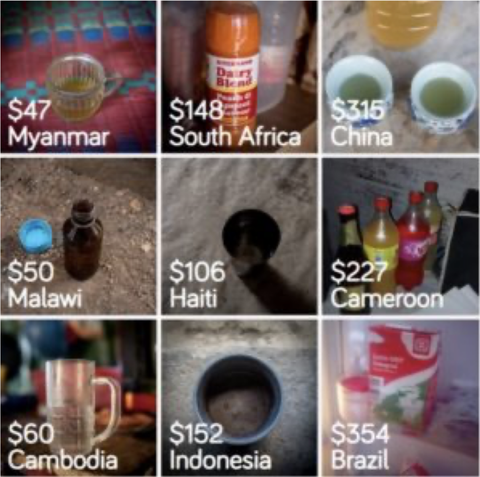The Refugee Camp as Labo(u)ratory
Dissertation project by Ariana Dongus

Dataset linking object recognition and income in the so-called Global South to diversify Western datasets
The Refugee Camp as Labo(u)ratory.
Biometric Control and Gig work in the Global South: In/visible subjects of AI
This PhD project studies new forms of labor relations integral to global digital capitalism, which are emerging in the Global South. The project aims to foreground how some of the most advanced technological regimes have taken and are taking shape outside the so-called developed West (Breckenridge 2014; Mann 2017). In shifting the analytic lens to focus on these regions of the Global South, the project foregrounds the productive and essential role these regions play in the development of digital capitalism, while remaining marginalized by the hegemonic discourses of the West.
As the project analyzes the relation between humanitarian regimes and high-tech such as AI, it brings into question the role that high-tech plays in the extractive and exploitative operations of capital today, as well how and where technological production can be situated in relation to labor (Mezzadra and Nielson 2019). Extractions of data and labor in the so-called developing regions and its accumulation in the Global North are discussed with regard to the continuities of colonial modes of exploitation, while the analytical scope of traditional world systems theory is expanded against the background of feminist and postcolonial studies.
For the analysis, the notion of the high-tech labor lamp as laboratory is introduced to describe new extractive and experimental regimes in migration and humanitarianism. In refugee camps experimental matrices of computation are integrated into the economy of war and forced migration, while at the same time, refugee subjects emerge as new workforces around the globe. Tensions between capital and migrant mobility crystallize in high-tech labor camps and are expressed in refugee struggles.
The fact that refugee mobility is heavily controlled and refugees are usually prevented from entering traditional labor markets in the host countries to which they flee, serves a form of digital capitalism that is interested in outsourcing gig work tasks to regions with cheap labor costs (here, refugee camps) rather than in supporting labor migration and granting workers access to company headquarters in the West: While online work can be flexibly distributed along the competitive vectors of gig economies worldwide, the refugee workers’ freedom of movement remains restricted within limiting frameworks of humanitarianism such as the confining logics of camps (Aneesh 2006; Weizman 2011).
This situates the PhD project at the broader intersection where a ‘politics of migration’ and a ‘politics of control’ is forming a key tension in the history of capitalism and labor struggles (Mezzadra 2010). The PhD project includes case studies that focus on biometric identification and gig work and coding bootcamps in refugee camps where refugees are forced to undergo biometric registration by the UNHCR and can become workers in the gig economy, labelling training data for machine learning algorithms that are then used to automate complex perceptional tasks like vision (Dongus 2017, 2017, 2020). Clearly visible, automation does not replace, but rather displaces labor onto new refugee workforces; workforces which are the hidden human faces of automation (Irani 2016).
Historically, new technologies and experiments were always tested and carried out on minorities, groups perceived as inferior, poor and working-class subjects, from gynecology tests conducted on enslaved women in the 19th century, experiments on prisoners in the twentieth century, to Google’s coercive capture of facial scans from homeless people Google today (Owens 2017; The Atlantic 2019). Refugee camps, characterized by regimes of exception and marginalization (Agier 2011), by definition political-juridical grey areas, have hence become a fruitful ground for testing and experimentation. The notion of the high-tech labor camp as laboratory could thus serve as a tool to assess how frictions and struggles in today’s global arena of armed conflict, war, flight, forced and environmental migration give shape to the technical composition of the contemporary AI paradigm and promises to shed light on the role that hidden histories of experimentation play in this (Jacobsen 2010).
The term "camp as labo(u)ratory" used here suggests the 'dual function' of the camp as a reservoir of cheap labor and a site of experimentation. Finally, the intersection of labor and laboratory points to a third function related to how migration regimes as a whole are becoming economies of exclusion, and explores how migrants are made valuable through new economies of migration control and migrant labor.
